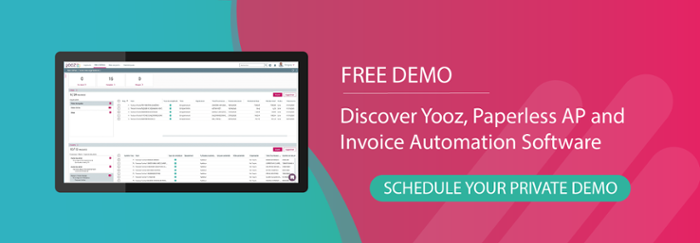The accounts payable process can entail a series of tedious and repetitive tasks. The hospitality industry is among the first to be affected. Fortunately, automating accounting processes can help to save time and enhance daily efficiency.
Key Accounting Challenges in the Hospitality Sector
The hospitality sector presents accounting peculiarities that make financial management more complex.
Firstly, hospitality businesses must deal with a wide variety of purchases and expenses, whether fixed or variable. Professionals in this sector have to chronologically record these movements throughout the year.
Challenges of Manual Transaction Management
Transactions related to suppliers, in particular, are numerous and manual processing carries significant risks:
Data Entry Errors
Data entry errors refer to inaccuracies or mistakes made during the manual input of information into accounting systems or records. In the context of hospitality organisations, these errors can occur when recording supplier invoices, employee expenses, or other financial transactions. Such errors might include typos, incorrect numerical entries, or misclassification of expenses. Data entry errors can lead to discrepancies in financial reports, which may impact decision-making processes and undermine the overall accuracy and integrity of financial records. Additionally, rectifying these errors can be time-consuming and may require extensive auditing or reconciliation efforts.
Creation of Duplicates
The creation of duplicates involves inadvertently generating multiple copies of the same transaction or document within the accounting system. In the hospitality industry, duplicate invoices or payments can arise due to manual processing errors, such as unintentionally re-entering the same invoice multiple times or mistakenly issuing duplicate payments for the same supplier invoice. Duplicate transactions can result in overpayment, accounting inaccuracies and reconciliation challenges. Moreover, identifying and resolving duplicate entries consumes valuable time and resources for accounting staff, detracting from other critical responsibilities.
Payment Delays
Payment delays occur when invoices are not processed and settled within the expected timeframe, leading to late payments to suppliers or vendors. In the hospitality sector, where timely payment of suppliers is crucial for maintaining positive supplier relationships and ensuring the uninterrupted supply of goods and services, payment delays can have significant ramifications. Late payments may result in strained supplier relationships, loss of supplier discounts or incentives for prompt payment and potential disruptions to the supply chain. Furthermore, prolonged payment delays can damage the reputation of the business and deter future suppliers from engaging in business transactions.
Loss of Invoices
The loss of invoices refers to the misplacement or failure to properly record incoming invoices from suppliers or vendors. In a manual or paper-based accounting system, invoices may be misplaced, lost in transit, or overlooked, leading to gaps in financial records and incomplete documentation of transactions. In the hospitality industry, where businesses rely heavily on a multitude of suppliers for various goods and services, the loss of invoices can impede accurate financial reporting, hinder expense tracking and compromise regulatory compliance.
Additionally, without proper documentation, businesses may face challenges in verifying transactions, reconciling accounts and addressing discrepancies during audits or inspections.
Challenges specific to the Hospitality Industry
Since the hospitality industry operates mainly in B2C, segregating revenues by customer is often impossible. Instead, professionals in this sector must allocate revenues according to the payment method: credit card, cash, cheques, etc.
In some establishments, employees are provided with meals by their employer, under certain conditions. Compensation for meals provided to employees constitutes a fringe benefit that must be considered in payslips, which can lead to social contributions for the employer and income tax for the worker. Furthermore, this fringe benefit must be accounted for in a specific account by the company's accounting department.
These specificities increase the workload of accounting teams, who already typically have a lot on their plate. This is where automating the P2P process comes in, allowing hospitality professionals to save valuable time by offloading the most repetitive tasks.
Automating the P2P Process to Address Hospitality Industry Challenges
Employees in the accounting and finance department generally spend a significant portion of their time manually entering supplier invoices. This percentage can be considerably higher in the hospitality sector, which generates a very large number of invoices.
Beyond the risk of error, document loss, or payment delay, manual processing of supplier invoices represents a loss of productivity for employees. Fortunately, they can now leverage new technologies to automate this time-consuming task.
Time saving is not the only value of automation. It also presents an opportunity for companies to improve their supplier relationships and focus on higher value-added activities.
Improving Supplier Relationships
Contrary to common belief, automating accounting does not dehumanise relationships with suppliers, whether on the company's side or on the suppliers' side. On the contrary, it improves the quality of exchanges.
Digitalisation significantly reduces errors and speeds up internal processes. Thus, hospitality professionals can scrupulously fulfill each of their commitments to suppliers and maintain a peaceful relationship with them, as well as a good brand image.
Fostering the Development of New Activities
Digitalisation does not replace the advisory role of accounting and finance department employees. Advice and guidance remain fundamentally human activities, requiring a deep understanding of customer needs and a certain level of empathy.
By freeing up time previously devoted to long and repetitive tasks, automation allows accountants to focus on high-value-added missions, such as optimising internal processes, analysing financial data, managing human resources and developing growth strategies.
Integrating P2P Process Automation in UK Hospitality Businesses
Hospitality organisations in the United Kingdom face a multitude of accounting and financial management challenges. In addition to the aforementioned specificities, such as the diversity of purchases, variations in fixed and variable costs and legal obligations, the following aspects also require careful consideration.
Tax and Fiscal Regulation Management
Tax compliance is a crucial aspect of accounting for hospitality businesses in the UK. In addition to corporate taxes and VAT, there are a multitude of sector-specific taxes, such as tourist taxes in certain tourist regions. Precise and efficient management of these taxes and fiscal regulations is essential to avoid penalties and maintain the financial health of the company.
Data Analysis and Financial Reporting
In addition to daily operational tasks, hospitality businesses need to regularly analyse their financial data to make informed decisions. This includes analysing sales trends, cost management, cash flow projection and preparing financial reports for shareholders and external stakeholders. Effective automation of the P2P process can free up valuable time to focus on these analytical and strategic activities.
Risk Management and Compliance
In a complex regulatory environment like the UK, risk management and compliance are major concerns for hospitality businesses. This includes compliance with food safety and hygiene standards, protecting customer data in accordance with the General Data Protection Regulation (GDPR) and compliance with labour and employment regulations. P2P process automation can help reduce the risks associated with non-compliance by ensuring accurate documentation and facilitating the tracking of internal policies and procedures.
Business Expansion and Growth
For hospitality businesses considering expansion or new business development, effective financial management is essential. This includes evaluating investment opportunities, seeking financing for expansion projects and long-term strategic planning. P2P process automation can free up resources to focus on these growth initiatives and help the business achieve its long-term goals.
Automating the Purchase-to-Pay (P2P) process offers many benefits to hospitality businesses in the UK. By simplifying accounting tasks, reducing errors and payment delays and allowing accounting professionals to focus on higher-value-added activities, automation can contribute to improving operational efficiency and overall financial performance. By investing in modern technological solutions and adopting a proactive approach to automation, hospitality businesses can remain competitive in an ever-changing market and continue to thrive in the long term.
Do you work in the hospitality industry? Learn how to quickly and easily automate your hospitality invoice process in just 30 minutes!
FAQs
What is a good strategy in managing accounts payable?
How can I be successful in accounts payable?
How do you improve accounts payable?
What are the 4 functions of accounts payable?

.jpeg)








